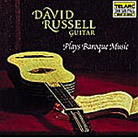October 2001
Here, within the 66-plus minutes of this disc, Russell’s guitar work teeters back and forth between the somber and the joyous. The expressiveness of his playing adds poignancy to these classic works. His transcriptions of compositions by Jean Baptiste Loeillet (Suite #1 in G minor), Antonio Vivaldi (Sonata in B flat major), George Frideric Handel (Sonata in A minor), and Dominico Scarlatti (Sonatas in D major, K490 & K492; C major, K501, K308 & K309; G major, K390 & K391; and F minor, K238 & K239) are most skillfully done. It’s here, with these transcriptions, that Russell demonstrates his worthiness as a successor to Andres Segovia and Julian Bream. Unfortunately, his playing does not reveal the same depth of emotion that pervades the artistry of Segovia and Bream (or Christopher Parkening, for that matter). The sound Telarc gives to Russell’s Matthias Dammann guitar in this 20-bit (alas, not DSD) recording is very fine. While not of the close-your-eyes-and-he’s-in-the-room level of clarity, every inflection of Russell’s playing is presented about as well as is possible on CD. You can easily follow both his hands on the strings, as well as the sound of the wooden guitar body. The only thing missing is ambience -- a consistent digital failing. David Russell’s choice of baroque music as the foundation for this album seems to be an appropriate one. Here is timeless music, created almost 250 years ago, that still makes modern ears yearn to hear it and modern fingers long to play it. It testifies to the permanence of certain ideas, and people. Bravo! GO BACK TO: |
 David Russell - Plays Baroque Music
David Russell - Plays Baroque Music![[Reviewed on CD]](../format/regcd.gif) Music
has always voiced the feelings of mankind. I grew up during the late 1960s, when music
played a huge role in defining the thoughts, fears and hopes of an entire generation. In
light of the tragic events of September 11th, I think that it will again assume
a much more somber significance. David Russell’s solo guitar work on Plays Baroque
Music is a moving testament to the power of the single voice.
Music
has always voiced the feelings of mankind. I grew up during the late 1960s, when music
played a huge role in defining the thoughts, fears and hopes of an entire generation. In
light of the tragic events of September 11th, I think that it will again assume
a much more somber significance. David Russell’s solo guitar work on Plays Baroque
Music is a moving testament to the power of the single voice.